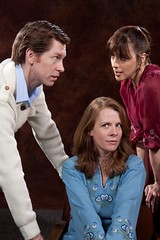 Oct. 2001 Review of No Man’s Land
Oct. 2001 Review of No Man’s LandReview by Mary Shen Barnidge
They met in a pub earlier that evening. Spooner is a garrulous down-at-heels poet given to soliloquizing after the style of T.S.Eliot’s “The Love Song of J. Alfred Prufrock.” Hirst, to whose home they have repaired, is a laconic square who responds with polite deference to his guest’s vulgar speculations about their respective marital histories. After imbibing an extraordinary amount of undiluted liquor in dainty nibbles, Hirst literally crawls off to bed and Spooner proceeds to steal all the cigarettes from the humidor, only to be interrupted by two rough-trade houseboys who warn him to watch his step. The next morning, Hirst is revealed to be a prestigious Man of Letters whose literary status soon reduces the arrogant Spooner to an obsequious acolyte pleading for favor.
Or so one may interpret the dynamic in Harold Pinter’s No Man’s Land. Spooner and HIrst might also be a pair of poufs dancing around the closet door. Or a couple of impotent hets crying over the women who left them. Or maybe their claim to have been school chums is genuine and this encounter a big-chill lament for their lost youth. And what’s with those domestic guard-dogs, Briggs and Foster, and the latter’s boast of hustling—girls, of course—in the fleshpots of the Far East? Pinter, renowned for his enigmatic iconography, offers us no overt signposts, instead inviting us to impose our own contexts on the action.
Neither does Remy Bumppo director James Bohnen nudge us in one direction over another, but allows us, if we wish, to ignore context altogether and just enjoy David Darlow and Joe Van Slyke in roles originally created by (and perhaps for) John Gielgud and Ralph Richardson. Together these seasoned players generate a tag-team sensitivity—how often do actors actually LISTEN to one another?—that transforms the long and almost exclusively two-character first act into a symphony of starts, stops, silences and significant stares.
Giving them a breather from time to time are Nick Sandys and Mark L. Montgomery as the ominous caretakers. Kudos also to Tim Morrison and Allison Boland’s excruciatingly tasteful décor whose very tidiness shimmers with suppressed menace.
Pictured above: NO MANS LAND: Nick Sandys, Joe Van Slyke, Mark Montgomery, David Darlow (2001)









